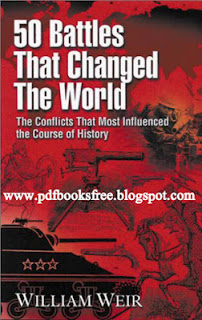 Title name of the book is “50 Battles That Changed The World” The conflicts that most influenced the course of history. Written by William Weir.
Title name of the book is “50 Battles That Changed The World” The conflicts that most influenced the course of history. Written by William Weir.Any decide to list the fifty most significant battles in all history are essentially subjective. To list them so as of importance is a good bigger exercise of chutzpah. Nevertheless, individuals are listing decisive battles since Sir Edward Creasy, a lawyer who taught history, a century-and-a-half ago. Alternative compilers embody General J.F.C. Fuller, knowledgeable soldier; Captain B.H. Liddell Hart, who was gassed and injured early in his career and had to go away the army—he then became a journalist, and Fletcher Pratt, who was an author by trade. Every one brings a particular flavor to the enterprise. Fuller is incredibly sturdy on battles that were fought on land. He is less curious about ocean power and much less curious about air power. Liddell Hart emphasizes his strategic theory—the superiority of the indirect approach. He, and to some extent Fuller, preaches the gospel of little, highly trained armies instead of the mass armies we’ve had in each major war since those of the French Revolution. Pratt’s The Battles that modified History has the distinct tang of salty air, though most of the first battles it covers were fought on land. Pratt conjointly has the foremost overtly Occidental orientation.
It might be exhausting to convince a Russian that the victories of Genghis Khan and therefore the consequent subjugation and isolation of his country for 3 centuries did not have abundant result on the stream of history. Considering that the Mongol conquests brought such Chinese innovations as low cost paper, movable sort, the astrolabe, and gunpowder to Europe, it would be tough to convince anyone else, either.
In this book, the author has tried to avoid this type of bias. however it’s a necessity to contemplate who we tend to are and where we tend to are. what is vital to the present author—an yank living at the juncture of the twentieth and twenty first centuries—and to his audience would most likely not be vital to a Chinese person within the thirteenth century. it has been fairly straightforward to avoid a bias in favor of any specific military approach. Author is the son of a career U.S. Navy officer and therefore the father of a career U.S. Air Force officer; however he has a frenzied civilian. Service as a military combat correspondent and regimental public data NCO within the Korean War gave me a rather broader image than most GIs get, however the most issue I learned was when to stay my head down. A number of the military in my upbringing might have rubbed off, though. Massive proportions of the articles He has written have involved military history and weapons. Of his four previous books, one, Fatal Victories, was entirely military history. Another, Written with Lead, was concerning legendary yank gunfights, as well as such military events because the Battle of Sara-toga and Custer’s last stand. Still another, A Well Regulated Militia, detailed the history of the yank militia.
Every battle has some result on history. How does one decide that had the most?
The basic criteria for selecting the importance of the battles that modified the planet are: How massive a modification did the battle create, and the way abundant will that modification have an effect on us?
One way is to choose what is extremely vital to us and the way did we tend to get to fancy it. Most of the people would place freedom and democracy high on any list of fascinating things. Consequently, Marathon, that preserved the world’s initial democracy, holds the number-one spot. Order, not anarchy, is additionally highly fascinating. Justinian, Narses and Belisarius, by crushing the Nika revolt, created the world’s most generally used code of law attainable. Bunker Hill, and to a rather less extent, Sara-toga, ensured the independence of the u. s.. So, in an exceedingly abundant less direct manner, did Jackson’s victory at New Orleans. The Allied victories in World War II, significantly the Battle of England, were the newest battles to ensure democracy.
Another approach is to appear at the currents of history. the traditional Greeks saw history, to an over-sized extent, as a record of the conflict between East and West. That’s definitely a viable plan. There are, during a} very general sense, 2 cultures within the world Western and Japanese. The previous would come with everything from the Orthodox influenced culture of Russia to the secular culture of the US. The latter would come with the so much Japanese culture of China and Japan, each deeply non-Western in spite of a Western veneer, and a good form of alternative cultures, several of them Islamic. Neither the East nor the West has managed to soak up the opposite; however it wasn’t for need of attempting. This struggle, too, goes back to Marathon. It continues through Alexander, Crass us and therefore the seemingly interminable conflicts between Christianity and Islam.
The West has been unable to soak up the East; however it definitely was ready to dominate it. There are a string of decisive battles that helped bring that concerning. At Diu on the Indian Ocean, Portuguese sailors destroyed a Muslim fleet in 1509. That crippled the thriving Arab trade with India and China. Dar es Islam began to shrink economically. 10 years later, Hernan Cortes landed in Mexico. 2 years then, he had conquered—for the primary time since Alexander a non-European empire that opened a trade route to the so much East across the Pacific. Russia’s conquest of Kazan in 1552 initiated European growth overland to the so much East. A generation later, the defeat of the Spanish Armada energized the English to push west across the Atlantic and conquer North America.
The latest trend in world history looks to be that the Western political domination of the planet is ending. In 1940, there was only 1 freelance country in Africa. Europeans owned the remainder of the continent. These days there are not any colonies in Africa. Most of Asia and therefore the so much Japanese islands, except, China, Japan, and Japan’s colony, Korea, were conjointly owned by Westerners. These days none of it’s. In a way, the battles of the yank Revolution started the trend. The U.S. became the primary freelance country within the New World. the remainder of the Americas followed.
In 1905, Togo’s Japanese showed that non-Caucasians equipped with trendy technology may beat Caucasians equipped with comparable technology. In 1914, Von Lettow Vorbeck’s black African troopers proved that, man for man; they were the equal of Caucasians. However none of the colonial countries may field the military equipment the Japanese may. It took a country, Ireland, to demonstrate how a weak nation may win its independence from a powerful one.
Download the complete book in pdf format to read offline.
Download link:
Download link
All the books posted here are only for reference and academic functions solely. If you actually love books please support the writers/poets and get the initial laborious copies from the book seller of your native market.
